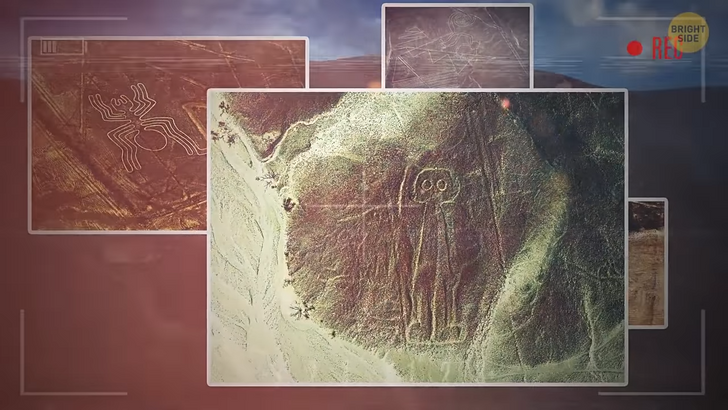14 People Who Had Such Embarrassing Situations That They’re Still Blushing

Under the burning sun, among the sand dunes, somewhere in the Sahara Desert, you’re walking in search of an ancient treasure. Finally, you find a strange rock in the sand. It’s big, looks like a large piece of black coal or rock, but something shiny on its surface makes the rock unusual.
This unique find is the oldest thing that has ever been discovered on our planet. This rock was born long before Earth appeared in outer space.
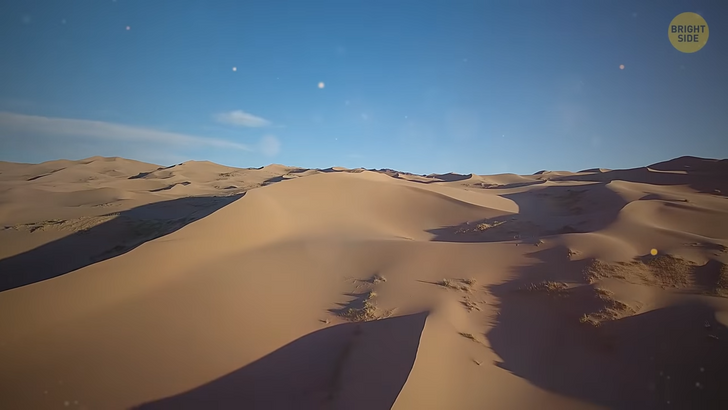
The unusual meteorite was found in 2020 in a remote area of the Sahara Desert. Scientists have analyzed the isotopes of magnesium and aluminum on the stone’s surface and found that its age is about 4.5 billion years. At the moment, this is the oldest sample of magma from space in history. It belongs to a small protoplanet that didn’t have time to form completely.
It happened a very long time ago when our solar system was forming. Many huge asteroids were floating in space. Some of them were formed into huge celestial bodies, which later became planets. The big rocky planets were absorbing the smaller ones. The rock was part of a little protoplanet that just began its formation. But another, huge asteroid destroyed it.
The planet shattered into billions of pieces. Some of them became part of other planets, some flew outside the solar system. And one piece had been wandering in space until our Earth was formed. After that, it hit the planet’s atmosphere and fell into the territory now known as the Sahara Desert. The rock was discovered in 2020.
But the erosion of extraterrestrial rocks shows that it could have fallen much earlier. This ancient thing weighing around 70 lbs [(~30 kg)] pounds has several pieces of different meteorites inside. In simple words, it’s a volcanic rock consisting of lava. It has cooled, solidified, and crystallized. That’s why you noticed the glitter. Scientists hope that further study of the rock will help to learn more about our Solar system foundation.
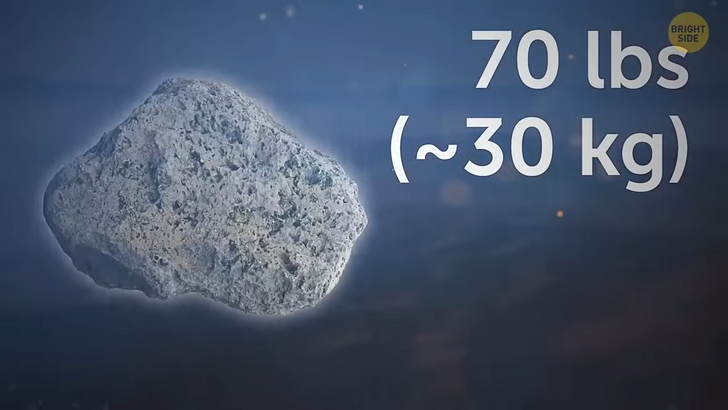
The biggest asteroid discovered in the U.S. is Willamette. Its size is 84 ft² [(~7.8 m²)] and its weight is more than >15 tons. This is half the weight of a bus. Several people can fit on the surface of this outer space object.
But the coolest thing is that it’s not a rock like most meteorites that were found. Willamette is made of nickel and iron. This massive piece of metal was discovered in 1906. Now, the huge rock is kept at the American Museum of Natural History.
The largest meteorite ever found is Hoba. It’s located in Namibia and people have never changed its position because it’s too heavy. The weight of Hoba is 60 tons. It’s heavier than a tank.
The next space-related event occurred on February 28 in Southwest England. On this day, a huge flash lit up the sky. Then, there was a loud crash. Several residents opened the doors of their houses and noticed a black sooty spot on the lawn. They immediately guessed what had happened and reported the discovery to the British meteorite observation network.
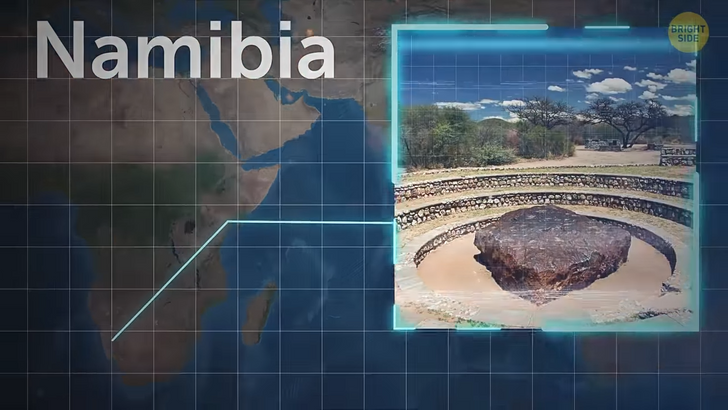
If you ever find a meteorite, report it to some geological research or space center as soon as possible. The longer a space rock lies on the ground, the faster it loses its value. Rain, dust, snow, wind, scorching sun — all these factors damage the surface of the meteorite. It makes it difficult to study the celestial object.
The meteorite found in England looks like coal, but it’s way softer and more fragile. It most likely used to contain frozen water. The rock is part of a huge asteroid that plowed through outer space when our solar system hadn’t fully formed yet. They found a unique combination of minerals inside the rock. It can help scientists learn more about the origins of the solar system and life on Earth.
Now we’re heading to Germany, to the small town of Nördlingen. A huge ancient meteorite’s hidden here. It’s very difficult to notice it unless you know the secret of this town. You’re walking along the cozy little streets and looking at the buildings with beautiful architecture. You spend the whole day there and don’t find anything that reminds you of a meteorite.
To solve the mystery, you need to get out of town. So, you climb a high hill and see that the city is located inside a pit. For a long time, locals were sure the town was located in the crater of an extinct volcano. If you look at the houses from a certain angle, you may notice an unusual shining coming from them.
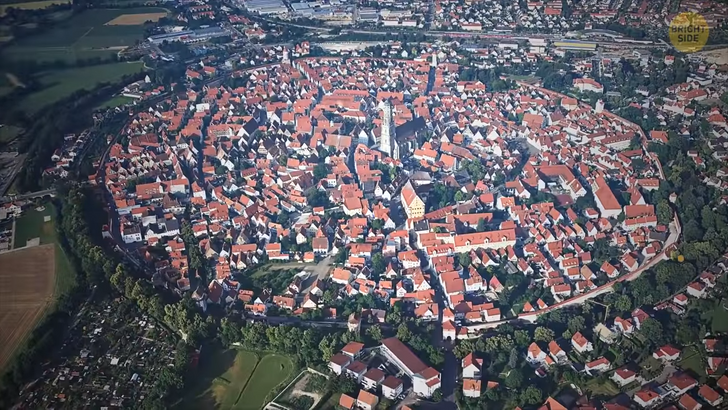
In the middle of the 20th century, a group of geologists came here and immediately declared that the crater doesn’t look like a volcanic one. The town was built on a huge crater left by a meteorite. The huge celestial body fell here about 15 million years ago. It was so hot that the carbon bubbles inside instantly turned into small diamonds.
When people were building this city, they didn’t know they were using expensive stones since the diamonds were hardly visible. The locals never attached importance to the fact that the city walls shine unusually in the sun. Now, they believe this place was built from diamonds that had fallen from the sky.
Our next stop is in the UK again. This time, the rocks are of an earthly origin. The famous Stonehenge. People placed circles of rocks here in a certain order. Everyone knows about this archaeological monument, but no one knows the reason for its creation for certain. Another construction built out of mysterious rocks was discovered just 2 miles away. It’s called Superhenge.
It’s bigger, heavier, and takes up more space. Each plate here is 15 ft [(~4.5 m)], which is about the height of two floors. Once, the stones stood vertically and formed a huge semicircle. But someone pushed the stones over about 4,500 years ago. It was a college prank. No not really. That’s why they couldn’t be detected for a long time. Scientists still can’t solve the mystery of Superhenge, but they believe the standing vertical stones were part of some huge monument.
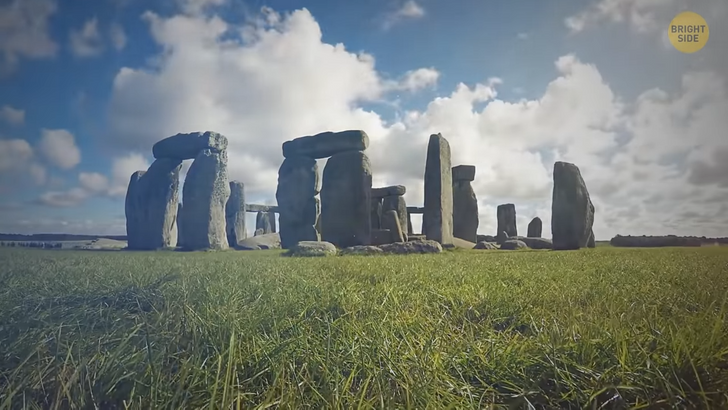
Some other amazing rocks are located in the South of Costa Rica. There are big ones the size of a human, and there are smaller ones the size of bowling balls. And they all have a perfectly round shape. These giant rocky spheres were created by people. It must have taken years of polishing using stone tools to get the perfect round shape.
These balls are incredibly heavy but can easily roll like a basketball. All the rocks are of a different age. Some of them were created about 2,500 years ago. Most of them are made of molten volcanic magma. Until now, scientists don’t know for what purpose these stones were used.
They were found in different parts of Costa Rica, near big cities. It’s possible that ancient civilizations installed them specifically to show the greatness of local kings. Also, many experts believe the rocks were used as a tool for studying astronomy. The people who knew their purpose of the rocks had disappeared and the history of the stones was lost along with them.
Let’s finish our journey with the coolest archaeological find. You’re walking through the desert of Peru and climbing a low hill. You look down and notice the surface of the hill is covered with strange lines. You walk far away and see a huge cat on the hill.
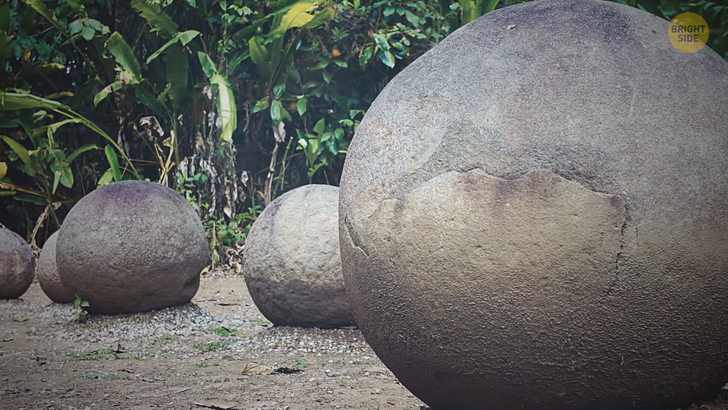
Such a drawing is called a Geoglyph. Its length is around 120 ft [(~35 m)] feet, which is about half the size of a Boeing commercial jet. Archaeologists discovered the giant cat in 2020 and found out that it had been created somewhere between 200 and 100 BCE. This huge drawing is part of a mysterious group of different pictures.
In addition to the cat, there are other animals, plants, and fantastic figures. All of them were found in the desert of Peru. The kitten was found by chance. Archaeologists didn’t see it at first, because natural erosion on the hillside has almost erased the silhouette.
